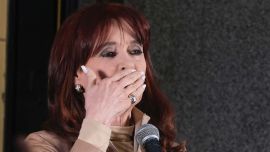British Prime Minister Liz Truss has quit after a brief and chaotic tenure that saw her announce a massive package of tax cuts before unwinding most of it in the face of a market rout.
The Conserative Party leader announced her resignation outside Downing Street just six crisis-filled weeks after taking office, becoming the shortest-lived premier in UK history.
The Tories detailed a rapid process to elect a new leader on October 28, setting a high bar of 100 nominations among its MPs for candidates – which might block any comeback by former PM Boris Johnson.
The race will be effectively limited to three candidates at the start, before the 357 Tory MPs vote on their preferred candidate on Monday. Party members will then get an online vote, in an accelerated timetable that avoids the drawn-out contest in which Truss defeated former chancellor of the Exchequer Rishi Sunak over the summer following Johnson's own resignation.
Candidates to replace her are likely to include Sunak, Penny Mordaunt, Grant Shapps and Kemi Badenoch. Former home secretary Suella Braverman, who was fired on Wednesday, may also be in the running. Defence Secretary Ben Wallace is often touted, though he has previously downplayed his interest.
In her speech, Truss admitted she "cannot deliver the mandate" on which she was elected by the members, after her right-wing platform of tax cuts disintegrated and as many Conservative MPs revolted. She said she would stay on as prime minister until a successor was chosen to serve as Tory leader.
"We've agreed that there will be a leadership election to be completed within the next week," she said, after senior backbench MP Graham Brady told her the game was up. "This will ensure that we remain on a path to deliver our fiscal plan and maintain our country's economic stability and national security."
Labour leader Keir Starmer, whose opposition party has surged in the polls on the back of Truss's short, eventful tenure, demanded a general election "now."
"This is not just a soap opera at the top of the Tory party," he said, warning of "huge damage" to the UK economy, although the pound surged against the dollar after Truss' dramatic announcement.
The Liberal Democrats also demanded a general election. “It is time for Conservative MPs to do their patriotic duty, put the country first and give the people a say,” leader Ed Davey said in a statement.
Tax-cut U-turn
Truss’ short and chaotic stint in office has left the Conservative Party and UK economy badly damaged just as inflation and surging energy prices are biting household budgets. The next general election isn’t expected until 2024, but polls showing the Tories languishing more than 30 points behind Labour point to growing public appetite for a change in governance.
Ultimately, a general election would only be called if a new prime minister or enough Tory MPs decided they wanted one, and at the moment that’s the last thing Tories want given the current polls.
The new prime minister should be in place in time for new chancellor Jeremy Hunt to deliver a crucial budget statement on October 31.
Hunt has already thrown out nearly all of debt-fuelled Truss' tax promises, which Sunak had warned would bring about higher inflation and market turmoil.
Sunak's warnings were vindicated, and the former official quickly emerged as the bookmakers' favourite. But he remains held in deep suspicion by Johnson loyalists.
Johnson himself was eyeing a comeback, the Times and Telegraph newspapers reported, despite remaining deeply unpopular with many Tory MPs and the electorate for the many scandals that brought him down.
Another potential runner is Mordaunt, a senior cabinet member who narrowly failed to make the Truss-Sunak run-off this summer.
The end for Truss came after a key minister resigned and many Tory MPs rebelled over an important vote in chaotic scenes at the House of Commons late Wednesday.
By Thursday morning, more than a dozen Conservative MPs had publicly urged Truss to resign, after her tax-cutting plans caused a market meltdown during an already severe cost-of-living crisis.
Many more were reported to have submitted letters to Brady calling for Truss to be removed, although party rules would have forbidden another leadership campaign for 12 months.
"The prime minister acknowledges yesterday was a difficult day and she recognises the public wanted to see the government focusing less on politics and more on delivering their priorities," her official spokesman told reporters.
Barely two hours later, she quit.
Reaction
Amid Russia's war in Ukraine and growing economic problems, Britain's allies have been observing the tumult with concern, with political instability recurrent since the country voted in 2016 to quit the European Union.
US President Joe Biden vowed to "continue our close cooperation with the UK government" on shared challenges including Ukraine.
"It is important that Great Britain regains political stability very quickly, and that is all I wish," French President Emmanuel Macron said.
Irish premier Micheal Martin said the need to resolve post-Brexit tensions in Northern Ireland was "ever more urgent" under Truss's successor.
For its part, Russia’s Foreign Ministry said Britain has "never known such a disgrace as prime minister."
– TIMES/AFP/BLOOMBERG



















Comments